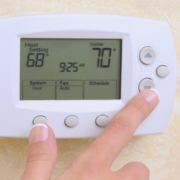Furnace vs. Heat Pump: Which Is Right for Your Home?
When it comes to keeping your home warm during the cold winter months, the choice between a furnace and a heat pump can be a daunting one. Both systems have their advantages and disadvantages, and making the right decision can significantly impact your comfort and energy bills. In this article, we will explore the differences between furnaces and heat pumps, helping you make an informed choice for your home.
Furnace or Heat Pump: Understanding the Basics
A furnace is a traditional heating system that utilizes either natural gas or electricity to generate heat. Its operation involves the heating of air, which is then distributed throughout your home via a network of ducts and vents. Furnaces have gained popularity due to their reputation for providing consistent and reliable heating, which makes them a preferred choice in regions with colder climates.
 In contrast, a heat pump is an energy-efficient heating and cooling system that can perform both functions. It achieves this by transferring heat from one location to another, utilizing a refrigerant cycle. Heat pumps are recognized for their versatility and energy efficiency, making them a favored option in areas with moderate climate conditions.
In contrast, a heat pump is an energy-efficient heating and cooling system that can perform both functions. It achieves this by transferring heat from one location to another, utilizing a refrigerant cycle. Heat pumps are recognized for their versatility and energy efficiency, making them a favored option in areas with moderate climate conditions.
Furnace or Heat Pump: Factors to Consider
When deciding between a furnace and a heat pump, several crucial factors should be taken into consideration:
Climate significantly influences the choice of the heating and cooling system suitable for your needs. Furnaces are more appropriate for regions with colder climates where consistent and efficient heating is vital. In contrast, heat pumps prove to be a better choice in milder climates where temperatures do not drop too low, and the need for extreme heating is less frequent.
Energy efficiency is a critical consideration. Heat pumps are more energy-efficient than furnaces because they can provide both heating and cooling functions, leading to potentially lower energy bills throughout the year. However, it’s worth noting that in extremely cold climates, the efficiency of heat pumps may decrease, affecting their performance.
 The initial cost of installation is another factor to weigh. Furnaces are typically less expensive to install initially. However, heat pumps often offer long-term savings due to their energy efficiency. When making your decision, it’s essential to consider both your immediate budget and the potential cost savings over time.
The initial cost of installation is another factor to weigh. Furnaces are typically less expensive to install initially. However, heat pumps often offer long-term savings due to their energy efficiency. When making your decision, it’s essential to consider both your immediate budget and the potential cost savings over time.
Maintenance requirements should also be taken into account. Furnaces need regular maintenance, such as filter changes and duct cleaning. In contrast, heat pumps, with fewer mechanical parts, are often easier to maintain.
If environmental impact is a concern for you, it’s worth noting that heat pumps have an advantage. They produce fewer greenhouse gas emissions compared to a gas furnace, making them a more environmentally friendly choice for those who prioritize sustainability.
Furnace or Heat Pump: Making Your Decision
When making the decision between a furnace and a heat pump, consider the following factors:
Opt for a furnace if you live in an area with harsh, extremely cold winters, where reliable and robust heating is of utmost importance. Additionally, if your home already has an existing ductwork system in place, a furnace may be the more practical choice. Moreover, if the initial installation cost is a significant factor for your budget, a furnace tends to be more budget-friendly in this regard.
A heat pump may be the better option if you reside in a moderate climate with mild winters, as it provides not only heating but also cooling capabilities, making it a year-round heating and cooling solution. If energy efficiency and environmental impact are high on your list of priorities, a heat pump produces fewer greenhouse gas emissions compared to traditional gas furnaces, making it a more environmentally friendly choice. Consider these factors carefully to determine which heating system aligns best with your specific needs and preferences.
Furnace or Heat Pump: The Choice is Yours!
In the battle of furnace vs. heat pump, there is no one-size-fits-all answer. Your choice should be based on your climate, budget, and preferences. Both systems have their advantages, and selecting the right one will ensure your home remains comfortable throughout the year.












